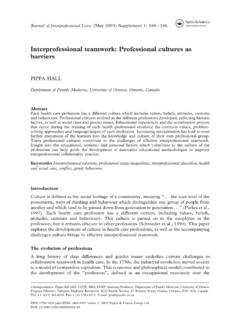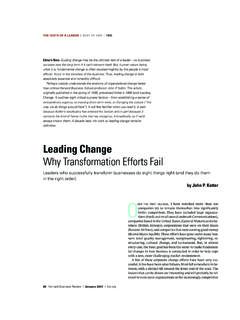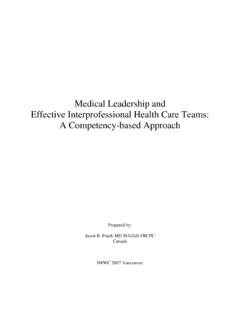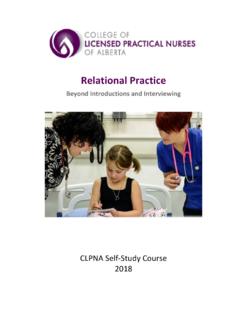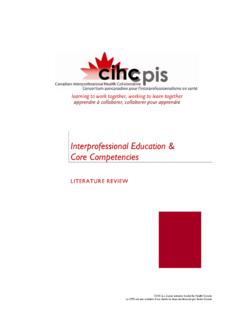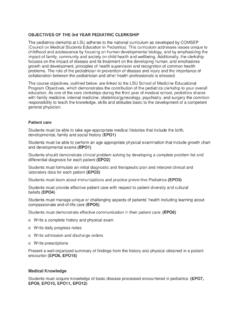Transcription of Interprofessional collaboration: effects of practice …
1 Interprofessional collaboration : effects of practice -basedinterventions on professional practice and healthcareoutcomes (Review)Zwarenstein M, Goldman J, Reeves SThis is a reprint of a Cochrane review, prepared and maintained by The Cochrane collaboration and published inThe Cochrane Library2009, Issue 4 collaboration : effects of practice -based interventions on professional practice and healthcareoutcomes (Review)Copyright 2009 The Cochrane collaboration . Published by John Wiley & Sons, A B L E O F C O N T E N T S1 HEADER ..1 ABSTRACT ..2 PLAIN LANGUAGE SUMMARY ..2 BACKGROUND ..3 OBJECTIVES ..4 METHODS ..5 RESULTS ..7 DISCUSSION ..8 AUTHORS CONCLUSIONS.
2 9 ACKNOWLEDGEMENTS ..9 REFERENCES ..13 CHARACTERISTICS OF STUDIES ..26 DATA AND ANALYSES ..26 APPENDICES ..27 WHAT S NEW ..27 HISTORY ..28 CONTRIBUTIONS OF AUTHORS ..28 DECLARATIONS OF INTEREST ..28 SOURCES OF SUPPORT ..28 INDEX TERMS ..iInterprofessional collaboration : effects of practice -based interventions on professional practice and healthcareoutcomes (Review)Copyright 2009 The Cochrane collaboration . Published by John Wiley & Sons, Ltd.[Intervention Review] Interprofessional collaboration : effects of practice -basedinterventions on professional practice and healthcareoutcomesMerrick Zwarenstein1, Joanne Goldman2, Scott Reeves31 Continuing Education, University of Toronto, Senior Scientist, Institute for Clinical Evaluative Sciences, Toronto, Education and professional Development, Facultyof Medicine, University of Toronto, Li Ka Shing Knowledge Institute ofSt.
3 Michael s Hospital, Toronto, Ka Shing Knowledge Institute & Centre for Faculty Development, St Michael s Hospital,Wilson Centre for Research in Education, Department of Psychiatry, Toronto, CanadaContact address: Merrick Zwarenstein, Continuing Education,University of Toronto, Senior Scientist, Institute for Clinical EvaluativeSciences, Room G1 06, 1075 Bayview Ave, Toronto, ON, M4N 3M5, (Editorial group:Cochrane Effective practice and Organisation of Care Group.)Cochrane Database of Systematic Reviews, Issue 4, 2009 (Status in this issue:Unchanged)Copyright 2009 The Cochrane collaboration . Published by John Wiley & Sons, : version first published online:8 July 2009 in Issue 3, assessed as up-to-date:16 September 2007.
4 (Help document -Dates and Statusesexplained)This record should be cited as:Zwarenstein M, Goldman J, Reeves S. Interprofessional collaboration : effects of practice -basedinterventions on professional practice and healthcare Database of Systematic Reviews2009, Issue 3. Art. No.:CD000072. DOI: B S T R A C TBackgroundPoor Interprofessional collaboration (IPC) can negatively affect the delivery of health services and patient care. Interventions thataddress IPC problems have the potential to improve professional practice and healthcare assess the impact of practice -based interventions designed to change IPC, compared to no intervention or to an alternate intervention,on one or more of the following primary outcomes: patient satisfaction and/or the effectiveness and efficiency of the health careprovided.
5 Secondary outcomes include the degree of IPC strategyWe searched the Cochrane Effective practice and Organisation of Care Group Specialised Register (2000-2007), MEDLINE (1950-2007) and CINAHL (1982-2007). We also handsearched the Journal of Interprofessional Care (1999 to 2007) and reference lists ofthe five included criteriaRandomised controlled trials of practice -based IPC interventions that reported changes in objectively-measured or self-reported (by useof a validated instrument) patient/client outcomes and/or health status outcomes and/or healthcare process outcomes and/ormeasuresof collection and analysisAt least two of the three reviewers independently assessed the eligibility of each potentially relevant study.
6 One author extracted datafrom and assessed risk of bias of included studies, consultingwith the other authors when necessary. A meta-analysis of study outcomes1 Interprofessional collaboration : effects of practice -based interventions on professional practice and healthcareoutcomes (Review)Copyright 2009 The Cochrane collaboration . Published by John Wiley & Sons, not possible given the small number of included studies and their heterogeneity in relation to clinical settings, interventions andoutcome measures. Consequently, we summarised the study data and presented the results in a narrative resultsFive studies met the inclusion criteria; two studies examinedinterprofessional rounds, two studies examined Interprofessional meetings,and one study examined externally facilitated Interprofessional audit.
7 One study on daily interdisciplinary rounds in inpatient medicalwards at an acute care hospital showed a positive impact on length of stay and total charges, but another study on daily interdisciplinaryrounds in a community hospital telemetry ward found no impact on length of stay. Monthly multidisciplinary team meetings im-proved prescribing of psychotropic drugs in nursing homes. Videoconferencing compared to audioconferencing multidisciplinary caseconferences showed mixed results; there was a decreased numberof case conferences per patient and shorter length of treatment, butno differences in occasions of service or the length of the conference.
8 There was also no difference between the groups in the number ofcommunications between health professionals recorded in the notes. Multidisciplinary meetings with an external facilitator, who usedstrategies to encourage collaborative working, was associated with increased audit activity and reported improvements to conclusionsIn this updated review, we found five studies (four new studies) that met the inclusion criteria. The review suggests that practice -basedIPC interventions can improve healthcare processes and outcomes, but due to the limitations in terms of the small number of studies,sample sizes, problems with conceptualising and measuring collaboration , and heterogeneity of interventions and settings, it is difficultto draw generalisable inferences about the key elements of IPC and its effectiveness.
9 More rigorous, cluster randomised studies withan explicit focus on IPC and its measurement, are needed to provide better evidence of the impact of practice -based IPC interventionson professional practice and healthcare outcomes. These studies should include qualitative methods to provide insight intohow theinterventions affect collaboration and how improved collaboration contributes to changes in L A I N L A N G U A G E S U M M A R YInterprofessional collaboration : effects of practice -based interventions on professional practice and healthcareoutcomesThe extent to which different healthcare professionals work well together can affect the quality of the health care that they provide.
10 Ifthere are problems in how healthcare professionals communicate and interact with each other, then problems in patient care can collaboration (IPC) practice -based interventions are strategies put into place in healthcare settings toimprove workinteractions and processes between two or more types of healthcare this review, we found five studies that evaluated the effects of practice -based IPC interventions, categorised as Interprofessional rounds, Interprofessional meetings, and externally facilitated Interprofessional audit. Three of these studies found that these interventions ledto improvements in patient care, such as drug use, length of hospital stay and total hospital charges.
